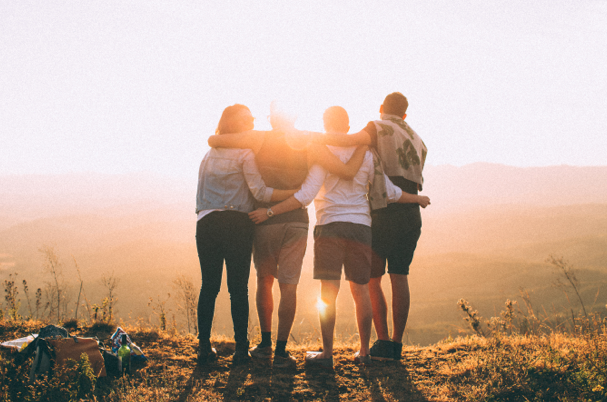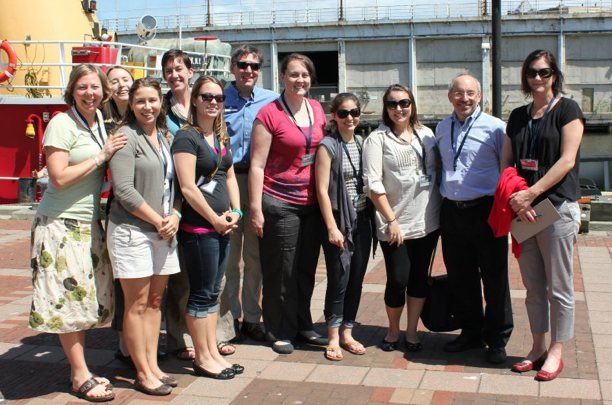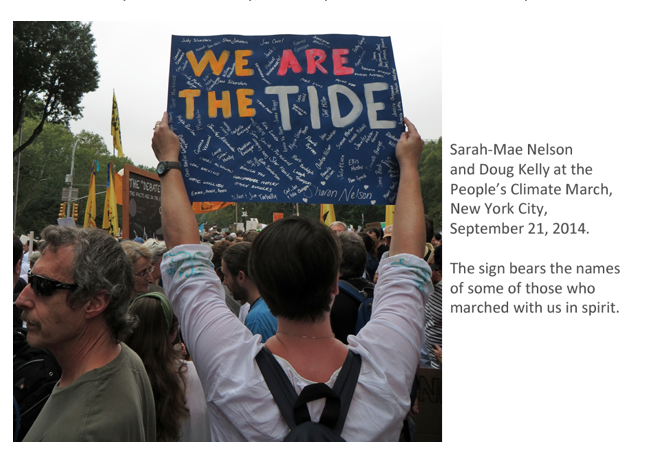My Community is My Hope #100HopefulDays

Today I turn 37 years old. This seems like an impossible number.
In my mind, I am a vibrant 21-year-old eager to make the world a better place. I see opportunities to make a positive difference everywhere. I am young, I am empowered, and I am unstoppable.
In reality, things might not always seem so rosy and, truthfully, some days I struggle with being overwhelmed. So how do I achieve—and maintain—this mental state?
I find my strength and my hope in my community.
I decided to pursue climate change communication as a profession in 2007 when the Fourth Intergovernmental Panel on Climate Change (IPCC) Report was released. I had known about climate change and its impacts on the ocean and planet since I could remember. I committed myself to a lifetime of conservation work when I was only ten-years-old, inspired by an article in Ranger Rick magazine, to use my talents to ensure the Earth does not end up as a pile of rubbish.
I am a marine biologist by training and an informal science educator by choice. I work at an Aquarium inspiring visitors to conserve the ocean. For the last 10 years, I have been a member of the National Network for Ocean and Climate Change Interpretation (NNOCCI) and the National Association for Interpretation (NAI). Every day I work with an amazing team of individuals who bring their personal passion and expertise to the frontlines of conservation. When I am having a bad day, there are at least 30 people I can turn to for encouragement or inspiration.

We depend on each other. My friends and colleagues come to me for answers to climate and ocean chemistry change questions. I go to my colleague Steve when I need help identifying a bird. I rely on Jadayah to help me stay abreast of what’s happening at the United Nations. Other friends share what’s happening at our National Parks.
On November 8, 2016 while teaching a class on the impacts of climate change on sustainable tourism, a student asked me, “Given what we are seeing unfold tonight, what hope do you have for combatting climate change?” My reply,
“Citizens will always be more powerful than presidents. The president is just one man. We are many. When we come together, uniting our voices, we have the power to change the course of history. It will not be easy, but if we persevere we will find our hope in action.”

One of the greatest moments of my life was participating in the People’s Climate March on September 21, 2014 in New York City. I was surrounded by over 400,000 people who all cared about what’s happening to our climate and who all knew we can make the choices for a better future. It was a day of solidarity and joy amidst the worry. I cried throughout the day, feeling intensely the connection to the thousands of people around me, and around the world, who stepped forward to take a stand.
I’ll be marching again April 29, 2017, in Washington, D.C. I look forward to meeting all who choose to join me.
More Blog Posts
 Connecting Higher Ed. And Public EducationConnecting Higher Ed. And Public Education by Richelle Tanner, May 09 2019 Public and higher education traditionally exist in separate spheres. And for good reason – there are different assumptions of prior knowledge, and different goals for informal educators vs. academic researchers. However, when it comes to highly-polarized, unfortunately [READ MORE]
Connecting Higher Ed. And Public EducationConnecting Higher Ed. And Public Education by Richelle Tanner, May 09 2019 Public and higher education traditionally exist in separate spheres. And for good reason – there are different assumptions of prior knowledge, and different goals for informal educators vs. academic researchers. However, when it comes to highly-polarized, unfortunately [READ MORE] Correcting the ‘Non-Debate’ Debate about Framing Climate ChangeCorrecting the ‘Non-Debate’ Debate about Framing Climate Change by Julie Sweetland, June 02 2016 Most people are familiar with the “non-debate” debate between the overwhelming majority of scientists who conclude that fossil fuels are contributing to disruptions to the climate system and the tiny but vocal few who deny it. Now, another “non-debate” [READ MORE]
Correcting the ‘Non-Debate’ Debate about Framing Climate ChangeCorrecting the ‘Non-Debate’ Debate about Framing Climate Change by Julie Sweetland, June 02 2016 Most people are familiar with the “non-debate” debate between the overwhelming majority of scientists who conclude that fossil fuels are contributing to disruptions to the climate system and the tiny but vocal few who deny it. Now, another “non-debate” [READ MORE] Metaphors Can Counter Misinformation about Climate ChangeMetaphors Can Counter Misinformation about Climate Change December 02 2016 This is the fifth post in a series about framing ocean and climate change. Our ability to communicate the science of climate change to the public is as important as ever. The outcome of the recent presidential and congressional elections and the state of public discourse [READ MORE]
Metaphors Can Counter Misinformation about Climate ChangeMetaphors Can Counter Misinformation about Climate Change December 02 2016 This is the fifth post in a series about framing ocean and climate change. Our ability to communicate the science of climate change to the public is as important as ever. The outcome of the recent presidential and congressional elections and the state of public discourse [READ MORE] IPCC Communications Tips for ScientistsIPCC Communications Tips for Scientists Allison Arteaga, February 07 2018 In late January, ahead of the anticipated release of a new IPCC report later this year, the Intergovernmental Panel on Climate Change (IPCC) released a new handbook for their scientific authors on how to more effectively engage the public and communicate about climate change [READ MORE]
IPCC Communications Tips for ScientistsIPCC Communications Tips for Scientists Allison Arteaga, February 07 2018 In late January, ahead of the anticipated release of a new IPCC report later this year, the Intergovernmental Panel on Climate Change (IPCC) released a new handbook for their scientific authors on how to more effectively engage the public and communicate about climate change [READ MORE] California Marine Life Feeling the Heat of Climate ChangeCalifornia Marine Life Feeling the Heat of Climate Change By Lisa Marie Potter, February 18 2016 Monterey Bay is home to an astonishing array of marine life, from kelp forests to sea otters to migrating whales. The secret to its productivity: the California Current. Monterey Bay’s rich ecosystem naturally varies in response to physical changes in [READ MORE]
California Marine Life Feeling the Heat of Climate ChangeCalifornia Marine Life Feeling the Heat of Climate Change By Lisa Marie Potter, February 18 2016 Monterey Bay is home to an astonishing array of marine life, from kelp forests to sea otters to migrating whales. The secret to its productivity: the California Current. Monterey Bay’s rich ecosystem naturally varies in response to physical changes in [READ MORE]